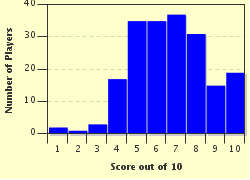Quiz Answer Key and Fun Facts
1. Which Roman emperor blamed the Christians after Rome caught on fire in A.D. 64?
2. Around 270 A.D. this man gave away his possessions and became one of the first notable Christian hermits.
3. What was the name of the meeting in 325 A.D. that decided that Jesus was God and was equal with the Father?
4. In 405 this man finished his Latin Bible that would become the official Bible of the Roman Catholic Church in the Council of Trent.
5. In 432 A.D. Saint Patrick went as a missionary to which country where he had worked as a slave?
6. In what year did the Roman Catholic Church become distinct from the Eastern Orthodox Church?
7. In 1273 this man completed his famous work, "Summa Theologica."
8. The 1500s saw which man leading the Protestant Reformation in Switzerland?
9. In the 1500s King Henry VIII of England approved the Act of Supremacy, which made the king, not the pope, the head of the church.
10. George Fox was one of the early leaders of the Baptists in the 1600s.
Source: Author
OJR1
This quiz was reviewed by FunTrivia editor
agony before going online.
Any errors found in FunTrivia content are routinely corrected through our feedback system.


